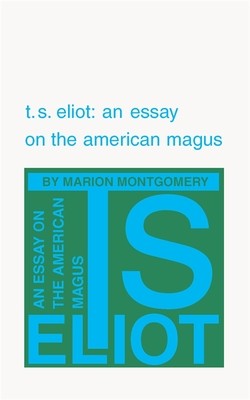
- We will send in 10–14 business days.
- Author: Marion Montgomery
- Publisher: University of Georgia Press
- ISBN-10: 0820331953
- ISBN-13: 9780820331959
- Format: 12.7 x 20.3 x 0.7 cm, softcover
- Language: English
- SAVE -10% with code: EXTRA
Reviews
Description
This brilliantly allusive and gracefully written study is focused on T. S. Eliot's developing commitment to Christianity, but the essay is by no means procrustean or reductive in its strategies, nor is it theological.
Montgomery shows how Eliot's intellectual and emotional uneasiness in the early poems is reflected in such technical devices as point of view and imagery. The questions of the poem's voice and the poet's mask (which are often ironic in nature) become less pressing as time goes on, and finally Eliot comes to a dynamic stillness--a frozen point in the sea of change that is variously called nature, history, and society. This stillness embodies the poet's rendering of Christian incarnation--the Word within the word. The author finds too that Eliot's imagery grows richer during the progress of his spiritual journey. As the imagery becomes more religious it also grows more complex and more concrete. Eliot in the end decides the poet's personal struggle to know his world is more important than the poetry which "does not matter," as he says in East Coker. Paradoxically the poetry of T. S. Eliot takes on an increasingly classical quality as it steadily becomes more personal and Christian. Montgomery accordingly shows how Eliot ultimately arrives "where he started and sees the place for the first time."EXTRA 10 % discount with code: EXTRA
The promotion ends in 20d.20:53:36
The discount code is valid when purchasing from 10 €. Discounts do not stack.
- Author: Marion Montgomery
- Publisher: University of Georgia Press
- ISBN-10: 0820331953
- ISBN-13: 9780820331959
- Format: 12.7 x 20.3 x 0.7 cm, softcover
- Language: English English
This brilliantly allusive and gracefully written study is focused on T. S. Eliot's developing commitment to Christianity, but the essay is by no means procrustean or reductive in its strategies, nor is it theological.
Montgomery shows how Eliot's intellectual and emotional uneasiness in the early poems is reflected in such technical devices as point of view and imagery. The questions of the poem's voice and the poet's mask (which are often ironic in nature) become less pressing as time goes on, and finally Eliot comes to a dynamic stillness--a frozen point in the sea of change that is variously called nature, history, and society. This stillness embodies the poet's rendering of Christian incarnation--the Word within the word. The author finds too that Eliot's imagery grows richer during the progress of his spiritual journey. As the imagery becomes more religious it also grows more complex and more concrete. Eliot in the end decides the poet's personal struggle to know his world is more important than the poetry which "does not matter," as he says in East Coker. Paradoxically the poetry of T. S. Eliot takes on an increasingly classical quality as it steadily becomes more personal and Christian. Montgomery accordingly shows how Eliot ultimately arrives "where he started and sees the place for the first time."

Reviews